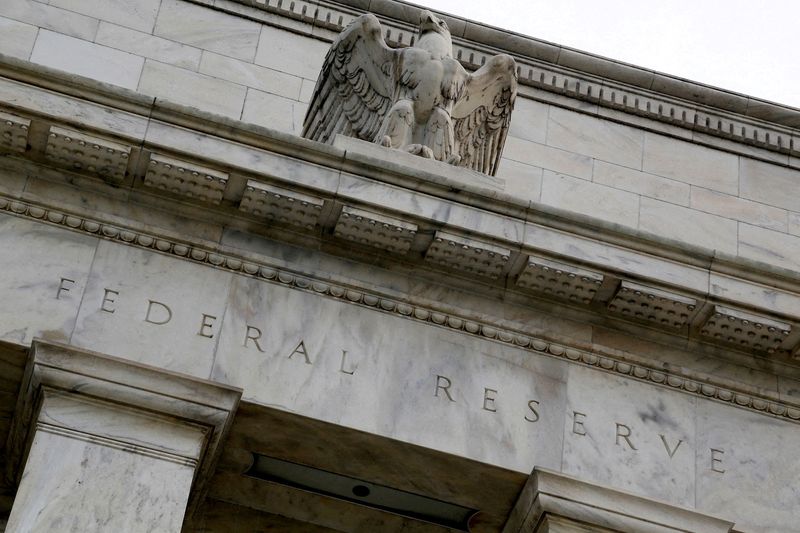By Michael S. Derby
NEW YORK (Reuters) - A little more than a year after a trading controversy rattled the Federal Reserve's standing in Washington and beyond, new ethics missteps have hampered efforts by the U.S. central bank and its chief, Jerome Powell, to put the matter behind them.
Over recent weeks, Atlanta Fed President Raphael Bostic acknowledged that over the last few years he'd accidentally broken standards then in place defining permissible investment activity. Meanwhile, St. Louis Fed President James Bullard generated controversy for speaking behind closed doors to a banker group on Oct. 14, raising fears those financial professionals were getting insider information on central bank deliberations.
These latest events show that as far as the Fed has come in tightening its ethical standards, its work is not yet finished. The central bank has won praise for adoption of a new ethics code that may be the most stringent in the U.S. government, but the program has yet to be fully implemented. At the same time, an in-house Inspector General (IG) investigation into the regional Fed trading activities still hasn't been released and it's unclear when it will be.
"I give (the Fed) a letter A grade for the changes that they made, the pace that they made the changes, the kind of ethical leadership from Powell in calling for the (IG) to do the investigation and for committing to not participate or have any influence on the Inspector General's report," said Kaleb Nygaard, who studies Fed history at the University of Pennsylvania.
"But until that is fully out, I don't think we can cast a full letter grade on them for their performance," he said.
TIGHTENING THE RULES
Recent developments followed the revelation in September 2021 that Robert Kaplan and Eric Rosengren, then the presidents of the Dallas and Boston Fed banks, respectively, had actively traded in financial markets while helping set monetary policy for the Fed. Both Kaplan and Rosengren retired unexpectedly that month. At the start of this year, Fed second-in-command Richard Clarida stepped down early while also facing questions about his own trading activities.
All three now-former central bankers said their financial activities were consistent with an ethics code that limited when officials could trade and prohibited ownership of bank stocks. An IG report in July cleared Clarida and Powell, whose trading activities also were investigated, of wrongdoing.
In the wake of the Dallas and Boston Fed resignations, the Fed in February formalized a new code banning a wide range of securities ownership for policymakers, senior staff and their families. It also imposed limitations on when those bound by the code can shift their financial positions.
As part of that effort to improve oversight, a Fed spokesman said the central bank had so far doubled to six the number of staff involved in the ethics process.
Unresolved in that process are publicly available disclosures for top staff at regional Fed banks. Right now, only disclosures for the Fed chief, members of the Fed's Board of Governors, top central bank staff and regional bank presidents are available. Given the quasi-private nature of the 12 regional Fed banks, there's no formal mechanism to compel those institutions to release this information.
The new system also offers waivers for certain situations, and it remains unclear how that process will be managed. Some ethics experts have been concerned that if these waivers aren't publicly disclosed they could allow the new rules to be undermined.
The Fed acknowledged giving a waiver in June to Richmond Fed President Thomas Barkin. It said on Friday the waiver Barkin requested deals with family trusts, which hold in part some prohibited company shares. The Fed noted that Barkin and his immediate family do not own, manage or benefit from the trusts in question, only that he "is primarily responsible for making decisions regarding distribution of the trusts' assets to the trusts' beneficiaries."
A Fed spokesperson said "we are continuing to review our disclosure practices" for central bankers covered by the new policy, and for making public waivers.
A spokesperson for the Fed's IG declined to say when the report on the regional Fed trading activity would be released or whether Bostic's activities would be included in it or would be the focus of a separate probe.
REGIONAL REVIEW
Some observers of the Fed hope that as it moves forward with tightening up its ethical standards it will take a more rigorous look at the regional Fed banks, where the most notable trading activity happened.
The Fed faced some criticism last year for failing to identify the financial trading activity that ensnared the regional bank presidents. All of the regional Fed bank presidents had just been vetted for new five-year terms in a process led by Lael Brainard, then a Fed governor and now the central bank's second-in-command.
The Fed committee that oversees the regional banks is now led by Governor Christopher Waller. Waller spent much of his career at the St. Louis Fed and, as a result, may have greater insight into how these institutions operate.
Peter Conti-Brown, a professor at the Wharton School of the University of Pennsylvania, said "I think the (Board of Governors) is extraordinarily lax in its oversight" of the regional Fed banks. He added that the complex central bank system is "awkward," but "that awkwardness doesn't give the Board license to ignore its oversight responsibilities."

Managing communications issues at the regional level could also be an issue in the wake of Bullard's recent closed-door talk to bankers, which the St. Louis Fed stressed came amid a very extensive slate of public commentary. His appearance may have skirted up against behavior the central bank's official communications policy says should be avoided.
The St. Louis Fed said on Oct. 20 "we are listening to the commentary around this and will think differently about this in the future."